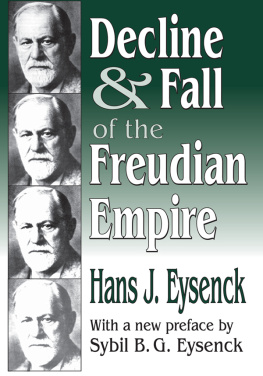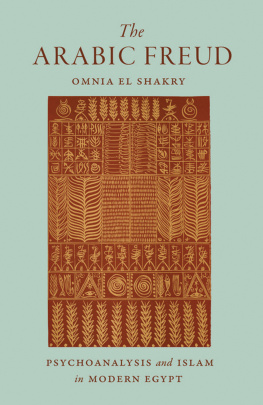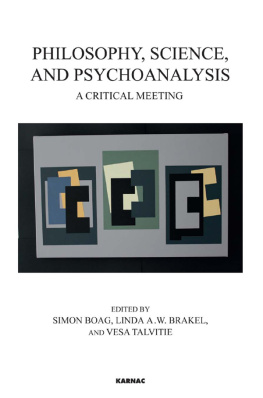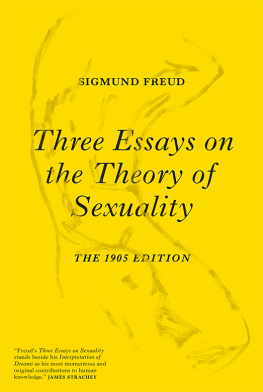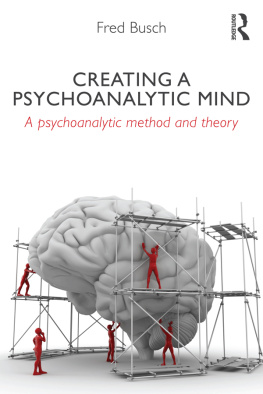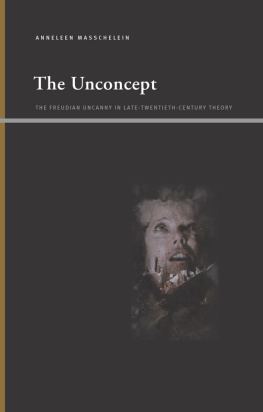Table of Contents
Decline
& Fall
of the
Freudian
Empire
Originally published in 1985 by Viking
Published 2004 by Transaction Publishers
Published 2017 by Routledge
2 Park Square, Milton Park, Abingdon, Oxon OX14 4RN
711 Third Avenue, New York, NY 10017, USA
Routledge is an imprint of the Taylor & Francis Group, an informa business
New material this edition copyright 2004 by Taylor & Francis.
All rights reserved. No part of this book may be reprinted or reproduced or utilised in any form or by any electronic, mechanical, or other means, now known or hereafter invented, including photocopying and recording, or in any information storage or retrieval system, without permission in writing from the publishers.
Notice:
Product or corporate names may be trademarks or registered trademarks, and are used only for identification and explanation without intent to infringe.
Library of Congress Catalog Number: 2004041192
Library of Congress Cataloging-in-Publication Data
Eysenck, H. J. (Hans Jurgen), 1916-
Decline and fall of the Freudian empire / Hans J. Eysenck ; with a new preface by Sybil B. G. Eysenck.
p. cm.
Originally published: Harmondsworth, Middlesex, England ; New York :
Viking, 1985.
Includes bibliographical references and index.
ISBN 0-7658-0945-1 (pbk.: alk. paper)
1. Psychoanalysis. 2. Psychotherapy. 3. Freud, Sigmund, 1856-1939. I. Title.
BF173.E89 2004
150.1952dc22 2004041192
ISBN 13: 978-0-7658-0945-2 (pbk)
Contents
Many years ago, my late husband, the author of this book, and I visited a distinguished American psychologist working at a New York psychiatric hospital. He opined that he would surely lose his job if he were to confess to misgivings about the efficacy of psychoanalytic therapy. Privately, however, he had his concerns and he welcomed Hanss 1952 article casting doubt not only on psychoanalysis but also on psychotherapy as a whole. (The Effects of Psychotherapy: An Evaluation, Journal of Consulting Psychology, 16, 319-324)
At that time, Freud was considered a messiah and psychoanalysis the savior of souls. So, the 1952 article brought an avalanche of criticism from practicing analysts who were appalled at the audacity of the challenge.
Years went by and Hans became more and more convinced that the blind adulation of Freud and his followers was unjustified. Indeed, many patients were being fooled into expensive and time-consuming sessions, yet cures were not by any means guaranteed. After much reading of Freuds work, Hanss considered view was that Freud was indeed a literary genius who expressed his theories with great eloquence. However, there was absolutely no attempt at any scientific verification of his psychoanalytic technique. You took Freud and his theory on trust or you were accused of some kind of subconscious resistance.
So basically, the main objection to all psychotherapies, and psychoanalysis in particular, was their lack of scientific theory or validation. Therapists relied on case histories and did not even pretend at scientific proof. There were many claims of successful treatments but also reports of disastrous failures and patients becoming worse after therapy. Perhaps this is why Hans decided, roughly thirty years after his 1952 article, that a more detailed expos was required and embarked in 1985 on the present book, Decline and Fall of the Freudian Empire.
It is all too easy to criticize, but the real strength of Hanss position was that he not only cast doubt on traditional psychotherapy and psychoanalysis, but that he suggested a viable alternative: behavior therapy. This was based on scientific learning theory and was subsequently shown to be infinitely more effective therapeutically to other forms of therapy.
It took considerable courage to write this book in the face of the zeitgeist of the times. Nowadays, few eyebrows would be raised as more and more psychologists and therapists have cast doubt on the value of counseling, especially as this has now become a growth industry and nobody has bothered to evaluate its efficacy
Of all the seventy-eight books Hans wrote this one is my favorite and may well be one of his best.
Sybil B. G. Eysenck
This is a book about Sigmund Freud and psychoanalysis. There are many such books, and the reader might rightly demand to know why he or she should be asked to pay good money to buy a new one, and spend precious time reading it. The answer is very simple. Most books on this topic are written by psychoanalysts, or at least by camp-followers of the Freudian movement; they are therefore uncritical, unaware of alternative theories, and written more as weapons in a war of propaganda than objective assessments ofthe present status of psychoanalysis. There are, of course, exceptions to this rule, and some of the most important of these are mentioned in the bibliography at the end of this book Important new books, such as those by Sulloway. Ellenberger, Thornton, Rillaer, Roazen, Fromkin, Timpanaro, Gruenbaum, Kline, and others are long and highly technical; they are invaluable to the professional student, but cannot be recommended to non-professional readers trying to find out what modern scholarship has discovered about the truth or falsity of Freudian doctrines. But for the sake of readers who wish to check for themselves, I have referred in the text to the major historical writers who have carefully looked at the evidence and given detailed accounts of what actually happened, with special reference to factual events, publications and other evidence available to all.
This book, then, is inevitably based on the scholarship of the people mentioned above, and many others whose works have been consulted. It is, nevertheless, special in bringing together material covering a wide range of topics within the general field of psychoanalysis the interpretation of dreams, the psychopathology of everyday life, the effects of psychoanalytic psychotherapy, Freudian psycho-history and anthropology, the experimental study of Freudian concepts, and many more. I have tried to do this in a non-technical manner, to make the book accessible to readers who have only a passing knowledge of Freudian psychoanalysis, and no professional background in psychology or anthropology. It would have been easier to write a book five times as long and full of technical jargon, but I have found it a salutary experience to try to reduce this wealth of material to the confines of a short, non-technical book. The effort of doing so cleared my mind of many preconceptions, and I am grateful to the many experts whose works I consulted, for clarifying puzzles and paradoxes that created numerous difficulties before.
I have given many lectures on the various topics discussed in this book, and these were inevitably introduced as being controversial. Similarly, I have no doubt that reviewers will call this book controversial, but with such an assessment I cannot agree. I have tried to deal with ascertained facts, and to add as little comment and interpretation as possible. The conclusions may be controversial because they disagree with previous assessments arrived at without the benefit of recent scholarship, but that does not make them contentious. It simply means that our knowledge has progressed, that our understanding has advanced, and that facts have been discovered recently which throw a new light on Freud and psychoanalysis.
Much of this new evidence is highly critical of claims made by Freud and his followers, and, as the title of this book suggests, the inevitable result has been a decline in the influence of Freudian theory, and in the esteem in which psychoanalysis is held. That there has been such a decline can hardly be doubted by anyone acquainted with the present climate of opinion among psychiatrists (qualified doctors with specialist training in the medical study of mental disorder) and psychologists (graduates in the scientific study of human behaviour), as well as philosophers, anthropologists and historians, in the United States and the United Kingdom. This disillusionment has not yet advanced as far in South America, France, and a few other countries which still cling stubbornly to outmoded concepts and theories. However, even there doubts are beginning to appear, and gradually they will follow the U.S. and the U.K.

